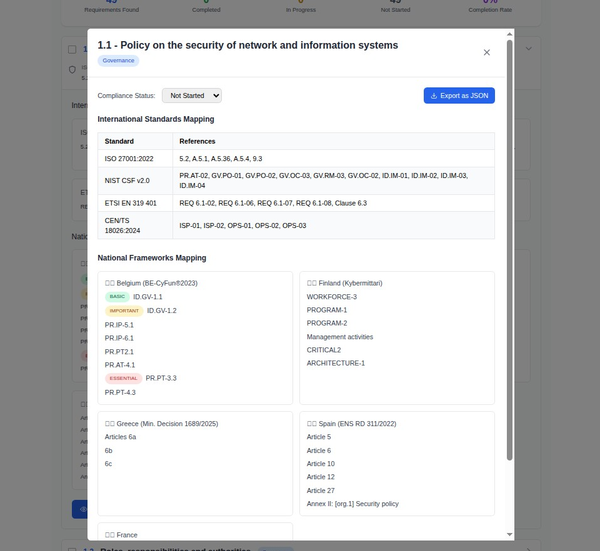The EU's Digital Services Act: A New Era of Online Regulation

The Digital Services Act (DSA) is a landmark piece of European Union legislation aimed at creating a safer, more transparent, and more accountable online environment. Adopted in 2022 and entering into full force in February 2024, the DSA represents a significant update to the EU's digital regulatory framework, replacing the 20-year-old e-Commerce Directive.

Key Objectives and Scope
The DSA's primary goals include:
- Protecting consumers and their fundamental rights online
- Establishing clear accountability for digital platforms
- Tackling the spread of illegal content and disinformation
- Ensuring a level playing field for businesses in the digital market
- Fostering innovation and competitiveness in the EU digital sector
The regulation applies to a wide range of online intermediaries and platforms operating in the EU, including social networks, content-sharing platforms, app stores, online marketplaces, and cloud services.
@cisomarketplace The Alarming Decline of Free Speech in the West Explore the shocking reality of freedom of speech restrictions in the Western world. This video highlights recent events, including the arrest of Telegram's CEO, and warns about the implications of the Digital Service Act. Stay informed on this critical issue affecting us all. #FreeSpeech #DigitalServiceAct #PavelDurov #ElonMusk #Censorship #EURegulations #HateSpeech #SpeechRights #TruthVsMisinformation #WesternDemocracy
♬ original sound - CISOMarketplace
Tiered Obligations
The DSA implements a tiered system of obligations, with requirements increasing based on the size and impact of the service provider:
- All intermediary services
- Hosting services
- Online platforms
- Very Large Online Platforms (VLOPs) and Very Large Online Search Engines (VLOSEs)
VLOPs and VLOSEs, defined as those with over 45 million monthly active users in the EU, face the most stringent requirements due to their outsized influence on public discourse and potential for societal harm.

Key Provisions
Content Moderation and Illegal Content
- Platforms must implement clear procedures for reporting and removing illegal content
- Users have the right to challenge content moderation decisions
- A ban on general content monitoring to protect free speech
Transparency and Accountability
- Platforms must disclose how their algorithmic systems work
- Regular risk assessments and independent audits for VLOPs and VLOSEs
- Increased transparency in online advertising practices
User Protection
- Enhanced safeguards for minors online
- Restrictions on targeted advertising, especially for sensitive data and minors
- Improved mechanisms for users to report illegal content

Platform Obligations
- Know Your Business Customer (KYBC) requirements for online marketplaces
- Measures to combat the spread of disinformation
- Crisis response mechanisms for VLOPs and VLOSEs
Enforcement and Penalties
The DSA will be enforced by both the European Commission and national authorities in EU member states. Each country must appoint a Digital Services Coordinator to oversee compliance. Penalties for non-compliance can be severe, with fines of up to 6% of a company's global annual turnover.
Impact and Implications
The DSA is expected to have far-reaching effects on the digital landscape:
- Increased legal certainty for businesses operating in the EU
- Potential global influence on digital regulation standards
- Challenges for platforms in implementing new systems and processes
- Possible shifts in business models, particularly around targeted advertising
Criticism and Concerns
While widely praised, the DSA has faced some criticism:
- Concerns about potential overreach and impact on innovation
- Questions about the practicality of enforcement across diverse national contexts
- Debates over the balance between content moderation and free speech

What are the main objectives of the Digital Services Act
The main objectives of the EU's Digital Services Act (DSA) include:
- Creating a safer digital space where the fundamental rights of users are protected. This involves tackling illegal content, goods and services online.
- Establishing a level playing field to foster innovation, growth, and competitiveness in the European Single Market and globally.
- Enhancing transparency and accountability of online platforms regarding content moderation, advertising, and algorithmic processes.
- Protecting consumers and their fundamental rights online by setting clear rules for digital service providers.
- Combating the spread of illegal content, disinformation, and other societal risks on online platforms.
- Implementing stricter regulations for very large online platforms and search engines due to their outsized impact.
- Providing users with more control and choice over the content they see online.
- Strengthening the protection of minors in the digital environment.
- Ensuring legal certainty and harmonized rules for digital service providers across the EU.
- Facilitating the scaling up of smaller platforms, SMEs and start-ups by reducing compliance complexity.
- Enabling greater democratic control and oversight over systemic platforms to mitigate risks like manipulation or disinformation.
The DSA aims to achieve these objectives through a comprehensive set of rules that apply to various online intermediaries and platforms, with obligations increasing based on the size and impact of the service provider. The regulation represents a significant update to the EU's digital regulatory framework and is designed to address the evolving challenges of the digital age.
Conclusion
The Digital Services Act represents a significant step in the EU's efforts to regulate the digital sphere. By establishing clear rules and responsibilities for online platforms, the DSA aims to create a safer and more transparent online environment for EU citizens while fostering innovation and competition. As it comes into full effect, its impact on the global digital landscape will be closely watched by policymakers, businesses, and users alike.







